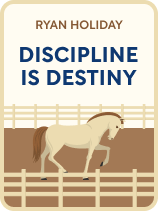

This article is an excerpt from the Shortform book guide to "Discipline Is Destiny" by Ryan Holiday. Shortform has the world's best summaries and analyses of books you should be reading.
Like this article? Sign up for a free trial here.
How well do you tolerate pain? Do you have the urge to fight back when people treat you poorly? Do you let failure keep you from reaching your goals?
As you go through life, you’ll inevitably encounter hardship. However, Discipline Is Destiny by Ryan Holiday asserts that practicing discipline can help you deal with three types of hardship: pain, negativity, and failure.
Check out how to deal with hard times and push through to brighter days.
1. Deal With Pain
To know how to deal with hard times, Holiday asserts that you must practice discipline by learning to tolerate pain. You must fight through your hardships (which are inevitable) if you want to have any chance of success. These hardships may seem impossible to overcome, especially if you’re experiencing significant physical pain or major mental health issues. However, Holiday insists that you must find a way to keep going despite this pain, whether that’s by finding an effective way to deal with it (such as by working through trauma) or by choosing to ignore it so you can work.
(Shortform note: If you’re struggling to tolerate and fight through pain, consider playing a sport. Although the research is inconclusive, some studies suggest that regularly experiencing the pain induced by training for and playing a sport may increase your tolerance for physical and mental pain. Scholars have different theories as to why: Some suggest that it’s because exercise increases endorphins, while others suggest that it’s because athletes instinctively use strategies for coping with pain.)
2. Deal With Negativity
To deal with negativity, Holiday asserts that you must practice discipline by resisting the urge to fight back. If someone behaves poorly toward you, you may understandably want to fight against them or defend yourself. But doing so likely won’t improve the situation and may even worsen it. So it’s best to choose not to engage with negativity—even when it seems impossible.
(Shortform note: Ancient Chinese philosophers agree with Holiday that you should avoid fighting. In the Tao Te Ching, Lao Tzu argues that peace should always be your top priority as aggression only pushes people away, and violence only makes you seem unstable or desperate. But if you do choose to fight back, The Art of War’s Sun Tzu recommends that you do so only if you’re absolutely certain that you’re going to win.)
3. Deal With Failure
Holiday asserts that dealing with failure in a disciplined manner requires that you learn to handle it with grace. In general, don’t treat failure as an excuse to stop; remain persistent and pursue your goals despite the failure. Also, show yourself compassion: Instead of bombarding yourself with negative self-talk when you fail, talk to yourself as you would a friend. That said, don’t prioritize persistence above all else. Pushing forward is virtuous, but if you’re unable to admit that you need to stop because you’re not doing well, you’ll keep going even when you shouldn’t—and ultimately encounter an even more agonizing defeat.
| Other Ways to Handle Failure In Dare to Lead, Brené Brown names the ability to recover and move on from defeat “failure resilience,” and she asserts that it’s essential because you’re more likely to take risks and try new ideas if you’re confident that you can recover from any setback. A key component of developing failure resilience is questioning the story that you’re telling yourself about why you failed. This story is often driven by your own insecurities and so may lead you to beat yourself up unnecessarily or make illogical leaps; questioning that story can help you realize what’s true and what’s an assumption. Similarly, asking questions can help you decide when it’s time to quit. Specifically, experts recommend asking yourself why you originally undertook the project (to see if it’s veered from its original purpose), why you want to quit now, whether you’ve tried everything to make this pay off, and what you’ll gain from quitting. |

———End of Preview———
Like what you just read? Read the rest of the world's best book summary and analysis of Ryan Holiday's "Discipline Is Destiny" at Shortform.
Here's what you'll find in our full Discipline Is Destiny summary:
- Why your ability to practice discipline determines how successful you are
- How to practice discipline throughout various stages of your life
- Why the greatest enemy to discipline is your ego






